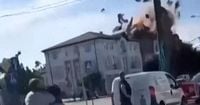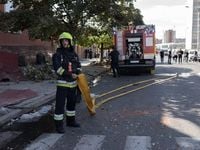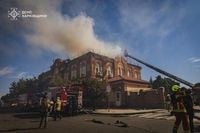On the morning of September 16, 2025, the city of Kharkiv, Ukraine’s second-largest metropolis, was rocked by a Russian drone strike that targeted the National University of Pharmacy. The attack, which occurred around 11 a.m. local time in the city’s central Slobidskyi district, left four people injured and caused significant damage to a historical building, underscoring the persistent threat faced by civilians in this embattled region.
According to multiple reports, including those from Reuters, Gwara Media, and The Kyiv Independent, the drone—presumably a Geran-2 kamikaze model—struck the roof of the university’s administrative building. The impact was sudden and devastating, sending a shockwave through the area and igniting a blaze that spread across approximately 150 square meters of the structure. The university, known for training future pharmacists, has been conducting all its classes online since February 22, 2025, due to ongoing threats of Russian attacks. As fate would have it, only staff members were present at the time of the strike, a decision that likely spared many lives.
The four injured included three women, aged 51, 52, and 54, and an 89-year-old man. All were employees of the university and, according to Governor Oleh Syniehubov, are currently in stable condition. One of the women suffered an acute stress reaction—a psychological trauma brought on by the harrowing experience. "I heard the sound (of the drone) right over my head. I was sitting at my computer, and my intuition told me to get up, I literally made two steps, and then the chandelier fell. There was an explosion, and the chandelier under which I had just sat fell down. That's what happened," recounted Nataliia Lavrova, a university worker, to Reuters. Her words paint a vivid picture of the chaos and terror that gripped those inside the building.
Vice-Rector Oleksandr Kukhtenko told Gwara Media that only employees were present in the building. "All of them evacuated to the first floor in time, so no one suffered serious injuries," he explained. Kukhtenko also noted the extent of the destruction: "It will take us a long time to repair it, and there are many questions regarding finances." The city government, represented by Mayor Ihor Terekhov, has pledged to assist with the repairs, recognizing the building’s significance both as an educational institution and as a historical monument protected by Ukrainian law.
The strike occurred in broad daylight, near a bustling market filled with workers and shoppers. The proximity to such a busy area amplified the fear and confusion among locals. "The explosions really scared locals because they saw the moment when the building was hit," Mayor Terekhov told Gwara Media. The damaged university building, a recognized historical monument, now bears the scars of war, another reminder of the cultural and human costs of the ongoing conflict.
Law enforcement authorities have launched an investigation into the nature of the drone used in the attack. Valeriia Chyrina, spokesperson for the regional Prosecutor’s office, said they are examining whether the drone was jet-powered. However, she later clarified to Gwara Media that no Russian jet drones have been recorded in Kharkiv or the surrounding region to date.
Video footage released by the regional prosecutor’s office and verified by Reuters shows the moment the drone hit the university, resulting in a massive explosion. The visual evidence, corroborated by satellite and street view imagery, leaves little doubt about the deliberate targeting of a civilian site. Governor Syniehubov was unequivocal in his assessment: "The strike was carried out in broad daylight, near the city center," he said, emphasizing that the facility was a purely civilian target with "no connection to the military or defense industry."
President Volodymyr Zelensky weighed in on the attack, using social media to express his frustration and to call for a stronger international response. "During the day, a strike hit the center of Kharkiv, targeting university buildings. The National University of Pharmacy—for Russia, simply a target. Russian guided aerial bombs continue to rain down on communities in the Sumy, Kharkiv, and Donetsk regions," Zelensky wrote. He lamented that such attacks have become "a typical day for Russia, which, unfortunately, continues to avoid truly strong global pressure in response to prolonging the war." Zelensky urged the international community to respond to every strike, stressing that only significant economic losses could force Moscow toward meaningful diplomacy.
The September 16 strike was not an isolated incident. As President Zelensky detailed on Telegram, Russia has launched more than 3,500 drones, nearly 190 missiles, and over 2,500 aerial bombs against Ukraine so far in September 2025 alone. Kharkiv, lying just 25 kilometers (about 15 miles) from the Russian border, remains a frequent target of such attacks, with the city’s residents forced to adapt to the constant threat. All local universities have moved their classes online since February, a precaution that has likely prevented even greater tragedy.
Despite a brief lull—Mayor Terekhov noted that there had been no Russian attacks on Kharkiv in the week preceding the strike—the events of September 16 were a stark reminder that the city’s reprieve was only temporary. Local authorities continue to urge residents to heed air raid sirens and exercise caution, as the risk of further attacks remains ever-present.
The aftermath of the drone strike has left the university community reeling, with staff members grappling with both the physical destruction and the psychological toll of the attack. For many, the path to recovery will be long and fraught with uncertainty. Yet, as Kharkiv’s officials and citizens rally to repair the damaged building and support the injured, their resilience in the face of adversity shines through.
As the war in Ukraine grinds on, the strike on the National University of Pharmacy serves as a stark illustration of the conflict’s far-reaching impact—not just on military targets, but on the very fabric of civilian life. The scars left on Kharkiv’s historic buildings and its people are a potent reminder of the urgent need for a lasting peace, and of the high stakes faced by those living on the front lines of Europe’s most volatile conflict.



